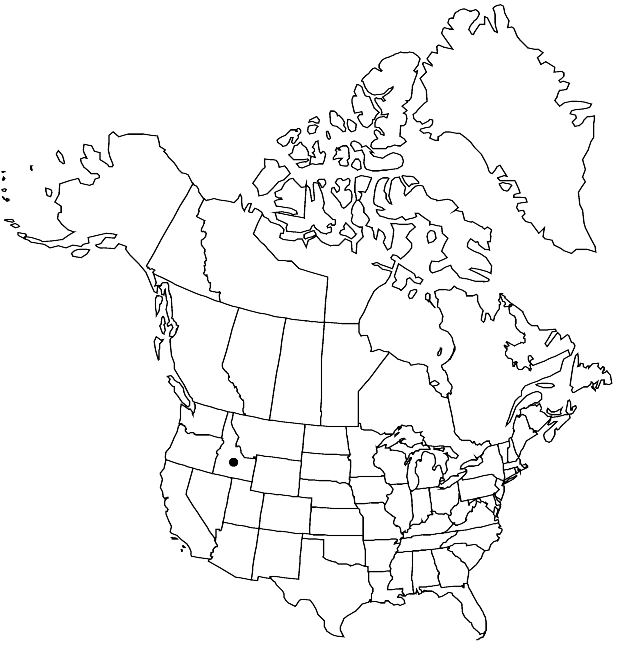familyBrassicaceae
genusPhysaria
speciesPhysaria didymocarpa
subspeciesPhysaria didymocarpa subsp. lyrata
Physaria didymocarpa subsp. lyrata
Novon 17: 379. 2007.
Common names: Idaho or salmon twinpod
Basionym: Physaria didymocarpa var. lyrata C. L. Hitchcock in C. L. Hitchcock et al., Vasc. Pl. Pacif. N.W. 2: 530, fig. p. 534 [upper left]. 1964
Trichomes appressed throughout. Basal leaves: blade margins ± lyrate or, rarely, entire. Fruits highly inflated, (papery); ovules 8 per ovary. 2n = 24.
Phenology: Flowering May–Jun.
Habitat: Gravel, alluvial fans, steep banks
Elevation: 1300-2100 m
Distribution
Loading map...

Idaho.
Discussion
Of conservation concern.
Subspecies lyrata is found only in the Salmon River drainage.
Selected References
None.
Lower Taxa
None.
No values specified."not" is not a number. "elongated" is not a number."thick" is not a number.
... more about "Physaria didymocarpa subsp. lyrata"
hypogynous +
dithecal +
dehiscing +
obtuse +
petiolate +
rosulate +
opposite +
absent +
auriculate +
oblanceolate;obovate +
absent +
branched +
pubescent +
woody +
well-developed +
distinct +
absent +
Idaho or salmon twinpod +
accumbent +
3[2]-fid +
absent +
Idaho. +
absent +
median +
dilated +
actinomorphic +
bisexual +
didymous +
inflated +
dehiscent +
dehiscent +
distinct +
absent +
racemose +
pungent +
watery +
absent +
connivent +
spreading +
decurrent +
repand +
absent +
1-seeded +
obscure +
confluent +
receptacular +
variable +
simple +
eseptate +
parietal +
apical +
decussate +
absent +
hypogynous +
alternate +
absent +
rudimentary +
spatulate +
2-carpellate +
4-11-colpate +
Novon +
2007 +
ebracteate +
congested +
divaricate +
sigmoid +
slender +
coiled +
accumbent +
conduplicate +
incumbent +
tiny +
simple +
indistinct +
not constricted +
slender +
biseriate +
flattened +
saccate +
distinct +
lateral +
absent +
reduced +
longitudinal +
Endemic +
tetradynamous +
equal +
decumbent +
several +
absent +
persistent +
distinct +
absent +
obsolete +
Physaria didymocarpa subsp. lyrata +
Physaria didymocarpa +
subspecies +
several-rayed +
mixed +
stellate +
appressed +
spreading +
stellate-scalelike +
dehiscing +
pubescent +
anastomosing +
not scapose +
perennial +
pubescent +
eglandular +
subshrub +
submerged +